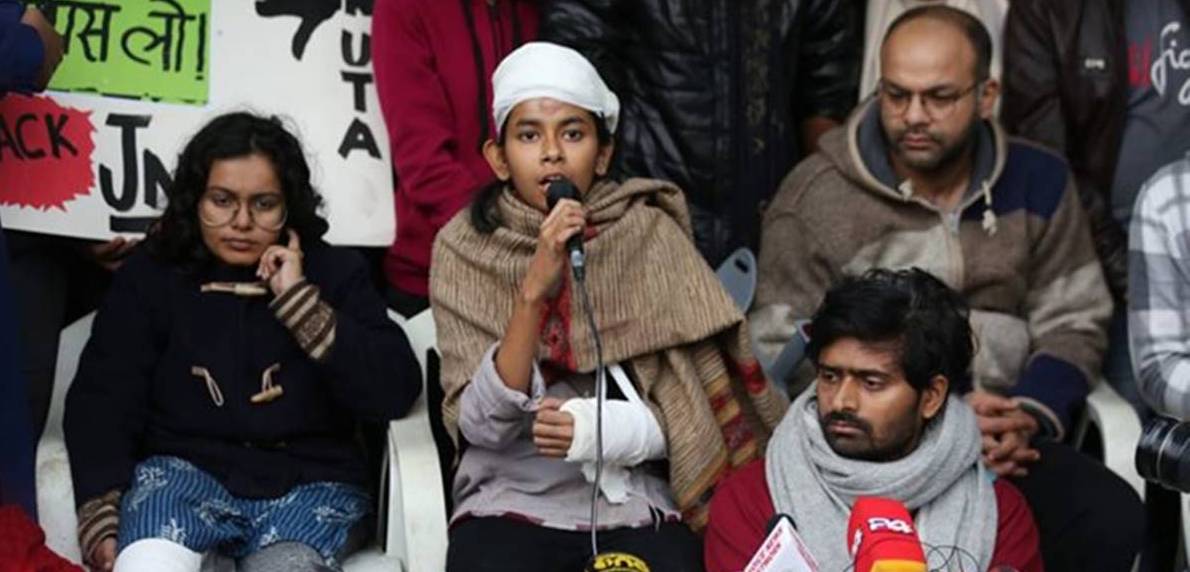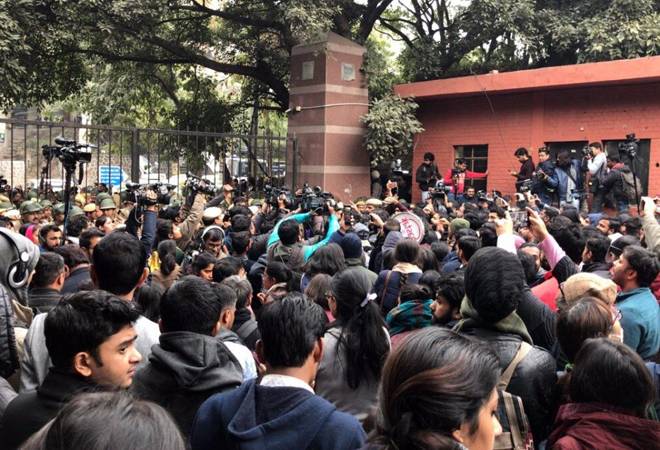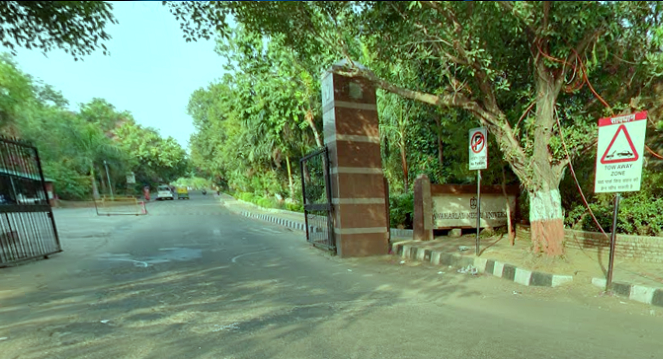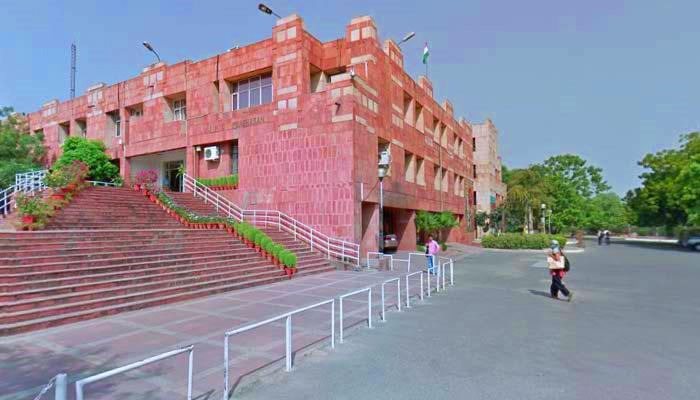SPECIAL ESSAY
In this piece written with extraordinary honesty and clarity, Benjamin Stewart – an engaged learner pursuing Master of Arts in Social Sciences with the University of Freiburg in Germany – has reflected on the curved trajectory he passed through at JNU, particularly when as a ‘foreign’ student he witnessed the academic and politico-cultural turmoil in a troubled semester.
Benjamin Stewart pursuing a Master of Arts in Social Sciences with the University of Freiburg in Germany.
I’m, what you would call, white. I’ve been to India before. I knew what to expect. Yet, nothing could prepare me for five months of studying at Jawaharlal Nehru University in the Delhi heat and smog. Nothing could prepare me for the challenge that would come to my whiteness during those five months. And nothing could prepare me for leaving the Indian context, and reentering a world of gray.

As an international student at JNU, you have to bob and weave through a lot of bureaucracy. Get six papers stamped in four offices and then get five signatures from apparition-like faculty. When someone makes a rare, ephemeral appearance in their office, you barricade the door and call all of your international friends. Sometimes, though, the mustaches and saris seem to phase right through the wall.
I entered JNU with a ton of motivation. I was at the head of the international student body, hunting down administrators and signatures, trading quips with the hostel caretakers, and trying desperately to rake together a working class schedule amongst the swamplands of changing class times, M.I.A. professors, and a patent lack of clear communication.
At this point, if you’re an Indian student, maybe you’re thinking ‘…And?’. Maybe you’re used to your success and progress resting on the temperament and whims of grumpy administrators who exercise their hierarchical insecurity by being as blatantly unhelpful as possible. I was not. I was not used to receiving every scrap of important information from an argumentative blob of WhatsApp chatter, instead of directly from the professors.
I accepted the logistical hardships as the challenge of new academic systems. It’s a bit silly to leave home and expect everywhere you go to be the same, right? Then one day, I had a class in a forested part of campus. The sun blazed amongst the peacocks and dry grass, but all seemed to be calm. Within the first minutes of class, however, we smelled smoke and shook ashes out of our hair. Two meters of flame ravaged the bushes behind us. As a class we scrambled up the path, beat the dirt with our shoes, pushing towards the road beyond the next turn. We ran on and on and then…. I realized that it was just myself and two other international students. We discovered that the professor moved the class up the hill, next to an outcropping of rocks, and continued the lecture. The unpredictable brushfire carried on ravaging the landscape. I went to my dorm, collected all of my important belongings, and left the dry, highly-combustible campus for the day. Later, I held a candid and concerned conversation with the professor about his decision to continue to hold class next to an unpredictable fire. We agreed to disagree. However, it was this event that began to transform how I thought about existence in the Indian context; how my security was tied to spirituality and whims rather than laws and principles.
The air pollution began to break records. The pre-monsoon temperatures danced around 40 Celsius, and I couldn’t walk outside of my door without my whiteness being thrown in my face. When I left campus, people played games with how badly they could scam the white foreigner. I thought that campus could be a sanctuary until a man entered our classroom, jamming himself against the door, and forced us to give him money in order to leave. The professor did nothing. Security did nothing.
Motivation entered a downward spiral. I attended two of each class before the student and faculty strikes plunged the university into uncertainty.
For six weeks, we did not hold a single class in my departments, and, often, they were canceled otherwise for unknown reasons. We were aimless. There’s no need to hash out the details of what the strikes were, and what they meant. This article isn’t about those. It’s about
my reflection as an international student. These strikes ended up challenging not only my selfworth as a student and an academic, but also my self-concept and value as a human.
To enter the strikes or not enter the strikes? As an international student, I was a student, and generally found myself obligated to support the students in their efforts. Being international, especially being a white male from North America, I found myself resisting involvement in order to prevent the accusation that I was imposing my ‘imperial’ values onto a cause I didn’t ‘fully understand.’ And it’s true – I didn’t fully understand -, but it’s damned clear that neither did the protestors. Disorganization and multiple, uncommunicative, often polemic, agendas plagued the movement. I was chastised for going to a protest (‘your whiteness is invading! this isn’t your movement! you’re an imperialist!’) and I was chastised for not going to protests (‘you’re not using your privilege to help us! your not supporting justice! you’re an imperialist!’).
A cohort of international students did take a definitive stance in favor of the student protestors. They drafted several letters that they would send to journalists abroad in order to attract international attention. Indian students advised these letters. Then, when the letters were presented to the entire group of protestors, chaos broke out. International students were accused of imperialism, of orientalism, of exoticism, and of every other -ism you can negatively attach to the situation. I was privy to this WhatsApp train wreck. The international students defended their good intentions and eagerness to learn, and local students volleyed verbal bombs of condescension and sympathy, a discourse that split into factions and warring ideologies. No clarity came from this discussion, but the acts of the international students became labeled as either ‘foreign intervention’ or ‘foreign aid’ – neither of which sit well in rhetorical politics in the Indian context.
Classes never really gained momentum after the protests ended. The semester puttered to a close without any finale or elucidation. I left New Delhi with a deeply problematized sense of self.
In India, my whiteness is coveted, as a status symbol, and as an assumption of high economic wellbeing. In India, my whiteness is abhorred for imperialism, both historical and contemporary. The same people that want to know me and be with me for my whiteness can also hate me for it. Everywhere I go in this world, my whiteness means something different, and I will never again be able to enter into a cultural context without the grayness of what that means and the ambiguity of how to live with it.
***














